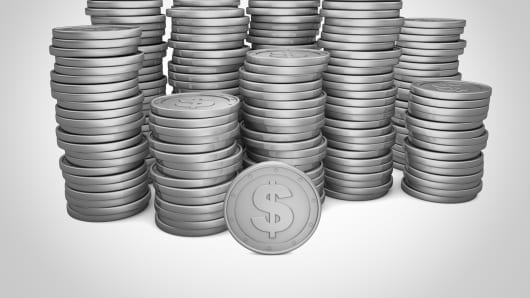I think people aren't taking the end of the coin seriously because they considered the coin a joke all along. They never considered the power of the coin to prevent a default on the debt because the idea seemed too ridiculous.
The idea was that the Treasury Department would mint a trillion-dollar coin and deposit it with the Fed, enabling the government to continue paying interest on the debt, Social Security benefits and other bills even after the debt ceiling had been breached. It had support from Paul Krugman, who vouched for its economic soundness, and Harvard Law School professor Larry Tribe, who vouched for the legality of the plan. As long as this platinum coin plan was viable, there was no way a debt ceiling impasse in Washington could force a government shutdown or a default on the debt.
Now that the Obama administration has taken the coin "off the table," a government shutdown is back on the table. So is a default on debt payment, although this may be avoidable if the Obama administration is willing to prioritize debt payments over other payments.
The Obama administration has been saying that it isn't interested in any other budgetary tricks. It believes this strengthens its argument that the Republican-controlled House must agree to raise the debt ceiling without any strings attached. So no 14th Amendment option, no IOUs, no special coins. It is at least hinting that prioritization may not be practically feasible.
Federal Reserve officials have told Steve Liesman that in connection with past budget crises, the Fed determined that it would not provide credit to the Treasury in the event that the government's bank accounts hit zero. Treasury officials, speaking on condition of anonymity, told me in 2011 that the Treasury won't cut checks if it believes it doesn't have the funds to pay for them.
In other words, if there is no deal there is at least a non-zero chance that we're going to default on our debt. This might not be anyone's ideal outcome. It may not be anyone's current plan. It may be suboptimal for everyone involved. But saying an outcome is undesirable for all parties is not the same as saying it is impossible. Think prisoner's dilemma.
We have no idea what would happen if we defaulted on our debt. There are some who believe that a few days, or even weeks, of missed interest payments wouldn't have catastrophic effects, especially if the U.S. eventually made it clear that all creditors would receive every dollar due. Others think the disruption to global financial markets would be swift and severe. Do we really want to test who is right?
Warren Mosler says that even without a default, going "cold turkey" on a balanced budget would create serious problems:
The economy hitting the debt ceiling and going cold turkey to a balanced budget is a far more catastrophic event than even going over the full cliff would have been, as it disables the "automatic fiscal stabilizers" and instead triggers a pro cyclical downward spiral in output and employment. That is, when the $25 billion/week spending cuts kick in and the economy slows, the falling tax revenues mean spending has to be cut more, nor can total spending on unemployment 'automatically' go up, etc.
In other words, if the economy slows because we've hit the debt ceiling, many of the safety nets we've built for the economy come apart. We'll be in a free-fall.



